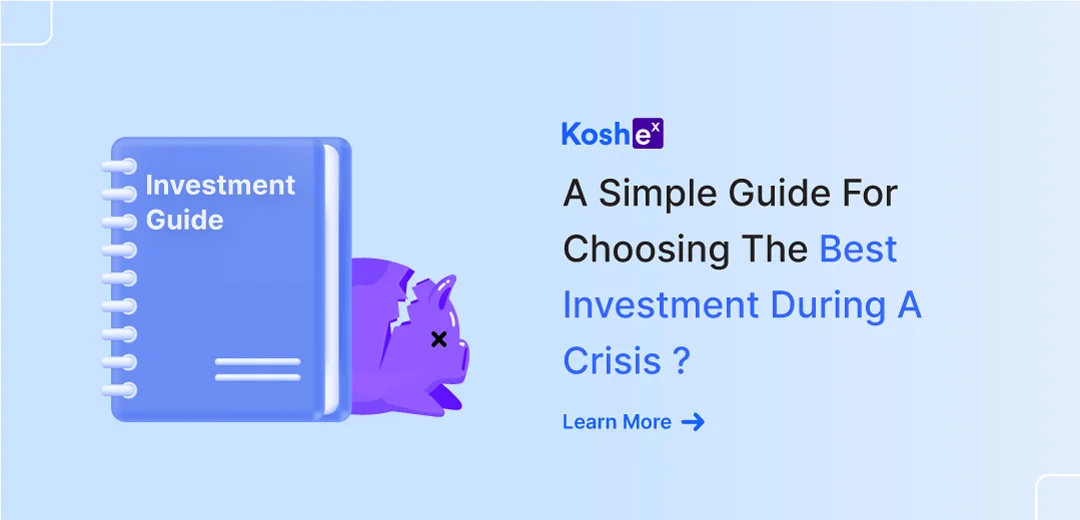During periods of financial uncertainty and economic downturns, investors may feel anxious about their investments.
However, a crisis can also offer chances for growth and success within one’s portfolio. The secret to success lies in making informed decisions through comprehensive research.
At the onset of a crisis, investors tend to redirect their investments towards sectors, industries, and asset classes perceived as “safe”.
These include technology, utilities, consumer staples, and gold. While these investments may help to mitigate losses in an equity portfolio to a certain extent, there is no assurance that they will lead to wealth creation in the long term.
With Koshex, readers can get tips and insights on selecting the best investments during a crisis, enabling them to navigate the market’s fluctuations confidently.
How to Invest During a Market Crisis?
1. Picking the Right Fundamentals:
The first step in picking companies during a market downturn is to focus on fundamentals. Fundamentals refer to a company’s underlying financial health and are a critical factor to consider when investing in the stock market. The following are some key elements of a company’s fundamentals that investors should pay attention to:
- Earnings: A company’s earnings per share (EPS) give investors an idea of its profitability. A company with a rising EPS over time is generally seen as a positive indicator of its financial health.
- Revenue: A steady increase in income over time suggests that a company is growing and expanding its business.
- Debt levels: A company’s debt levels provide information about its financial leverage and ability to pay back its debts. High debt levels can be a red flag, making a company more vulnerable during an economic downturn.
- Profit margins: A company with high-profit margins is generally considered more financially sound than a company with low-profit margins.
By focusing on these critical fundamentals, investors can better understand a company’s long-term financial health and potential for growth. However, it’s essential to remember that fundamentals are just one aspect when picking stocks. Market trends, industry trends, and other factors also play a role in determining a company’s potential for success.
2. Seeking Out Quality Companies
The second tip for picking stocks during a market downturn is to seek out quality companies. Quality companies have a proven track record of stability and growth, and they can be a good choice during a market downturn as they may have a higher chance of weathering the market turbulence.
Some more stable industries that are less affected by market downturns include technology, healthcare, and consumer goods. Some factors to look at for determining the quality of the company are financial stability, growth history, track record of management and leadership, revenue streams, etc.
By seeking out quality companies, investors can potentially identify investments that are less affected by market fluctuations and more likely to provide stable returns over the long term.
3. Looking for Undervalued Stocks
The third tip for investing during a market crisis is to look for undervalued opportunities. When the market is in a downturn, some stocks may become undervalued, allowing investors to purchase them at a discounted price.
Undervalued stocks are priced lower than their estimated intrinsic value, which is calculated based on earnings, revenue, and growth prospects. By looking for undervalued opportunities, investors can potentially identify investments poised for growth and recovery as the market improves.
4. Focusing on Non-Cyclical Sectors and Industries
The next tip for investing during a market downturn is to focus on sectors and industries less affected by economic cycles.
Some industries and sectors are considered more defensive and less affected by market fluctuations, providing a potential source of stability for your portfolio during a downturn. These industries and sectors include utilities, consumer staples, healthcare, and technology.
Industries such as utilities, healthcare, and consumer staples provide essential services that are in demand even during economic downturns, potentially providing a source of stability for the portfolio.
Also, companies in the technology sector often have a robust and resilient business model that allows them to weather market fluctuations and continue to grow even during a downturn.
By focusing on sectors and industries that are less affected by economic cycles, investors can potentially reduce the overall risk of their portfolio and increase the chances of weathering a market downturn.
5. Avoiding Emotional Investing
The final tip for investing during a market crisis is to avoid emotional investing. During times of market volatility, it can be easy for investors to make impulsive decisions based on emotions rather than a sound investment strategy. Emotional investing can result in poor investment decisions and significant losses. To avoid this, it is recommended that investors follow the following steps:
- Develop a well-defined investment strategy: Before making any investment decisions, investors need to have a clear investment strategy, including investment goals, risk tolerance, and time horizon. This will help ensure that investment decisions are based on a sound plan.
- Stick to the investment plan: During a market downturn, investors must stick to their investment plan and resist making decisions based on emotions. If a well-diversified portfolio has been established, there may not be a need for any changes to be made during a market downturn.
- Avoid market timing: Attempting to predict the market’s short-term movements is challenging and often leads to poor investment decisions. Rather than timing the market, investors should aim to develop a well-diversified portfolio and hold onto it for the long term.
Conclusion
Choosing the best investments during a crisis can be difficult for investors. However, following the guidelines outlined in this blog, such as conducting thorough research on fundamentals, seeking out quality investments, and avoiding emotional investing, can help minimize risk and increase the likelihood of success.
During a crisis, investing can be a stressful experience, but it can also present opportunities for those who are prepared and knowledgeable.
Investors can build on their wealth by taking a long-term perspective and following a disciplined approach. However, it is essential to remember that investing is not a one-size-fits-all approach, and every investor’s situation is unique.
With the right direction and strategy, a crisis may turn into an opportunity for financial success. Sign up with Koshex and get the best strategies to help you invest during a market crisis.
FAQs
1. What assets should I invest in during a crisis?
The choice of assets to invest in during a crisis depends on an individual’s investment goals, risk tolerance, and financial situation. However, some popular investment options during market downturns include bonds, gold, dividend stocks, tech stocks, real estate, etc. It is important to note that these investments come with their own risks, and it is essential to have a well-diversified portfolio to minimize overall risk.
2. Is it good to invest during a crisis?
Whether investing during a crisis is “good” depends on an individual’s investment goals, risk tolerance, and financial situation. In general, during a market downturn, the prices of many assets may decrease, creating potential buying opportunities for long-term investors. By investing in these assets at a lower price, there is potential to generate returns as the market recovers. When considering investing during a crisis, it is crucial to have a well-diversified portfolio and a long-term investment horizon.









Leave a Comment